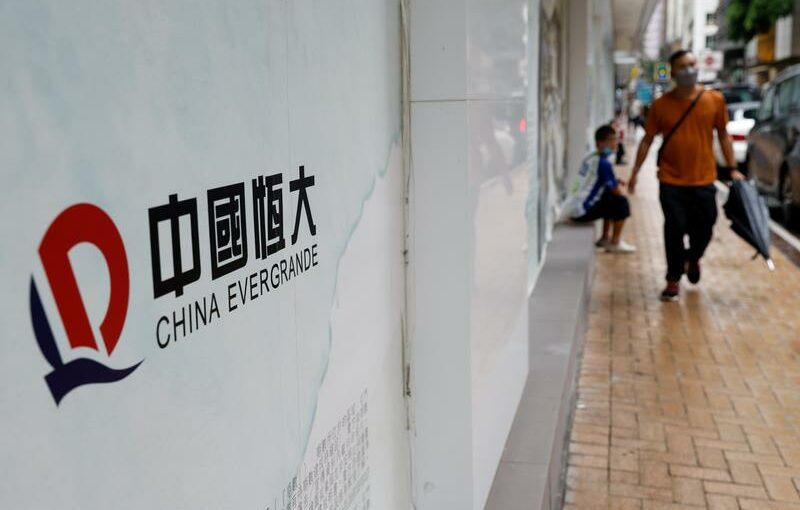HONG KONG (Reuters) -As China Evergrande Group looks set to miss its third round of bond payments in three weeks, markets remain on edge over contagion fears involving other property developers as a wall of debt payment obligations come due in the near-term.
A total of $38.8 billion offshore bonds issued by 40 Chinese developers will be maturing from October to end of 2022, according to brokerage CGS-CIMB, with the next peak of $6.2 billion in payments coming up in January.
The deadline for Evergrande’s $148 million of coupon payments was 0400 GMT Tuesday, but bondholders hadn’t received anything by end of Asian trading on Monday. Markets expect the distressed developer is likely to miss payments again, following two other payments it missed in September.
“We see more defaults ahead if the liquidity problem does not improve markedly,” said CGS-CIMB in a note, adding developers with weaker credit rating are having difficulty in refinancing at the moment.
Trading of high-yield bonds remained soft on Tuesday following a rout in the previous session on fears about fast-spreading contagion in the $5 trillion sector, which accounts for a quarter of the Chinese economy and often is a major factor in policymaking.
Shanghai Stock Exchange data showed the top five losers among exchange-traded bonds in morning deals were all issued by property firms.
Small developers Modern Land and Sinic Holdings were the latest scrambling to delay deadlines, after Evergrande and Fantasia missed their payments since September.
Modern Land’s dollar bond due 2023 plunged 25% to 32.250 cents on the dollar, while Sinic’s bond due 2022 rose 12% to 19.35 cents, yielding over 1380%.
Modern Land, whose shares dropped over 3% to new low on Tuesday, had requested bondholders on Monday to delay a repayment due later this month for three months, while Sinic said it would likely default next week.
Aoyuan’s bond due 2025 declined 3.5% while Sunac’s bond due 2024 lost 2.6%.
On Monday, Fantasia Holdings’ unit limited trading in its Shanghai bonds, which is often done ahead of defaults.
BROADER FALLOUT?
While global attention has been focused on missed dollar debt payments by Chinese property issuers, market indicators suggested that worries about contagion and a slowing economy are spreading further.
The cost of insuring against a China sovereign default continued to rise on Tuesday, with 5-year credit default swaps – which investors typically use as a hedge against rising risk – hitting its highest point since April 2020.
The option-adjusted spread on the ICE BofA Asian Dollar High Yield Corporate China Issuers Index pulled back to 2,061 basis points on Monday evening U.S. time, just off its previous all-time high of 2,069 basis points on Friday.
Shares of several other property firms, however, fared better as markets bet on more loosening of policies following northeastern city of Harbin’s measures to support property developers and their projects.
Top developers Country Garden and Sunac China both rose 2%.
Evergrande’s electric vehicles unit jumped over 10% after it vowed to start producing cars next year.
Source: Read Full Article
